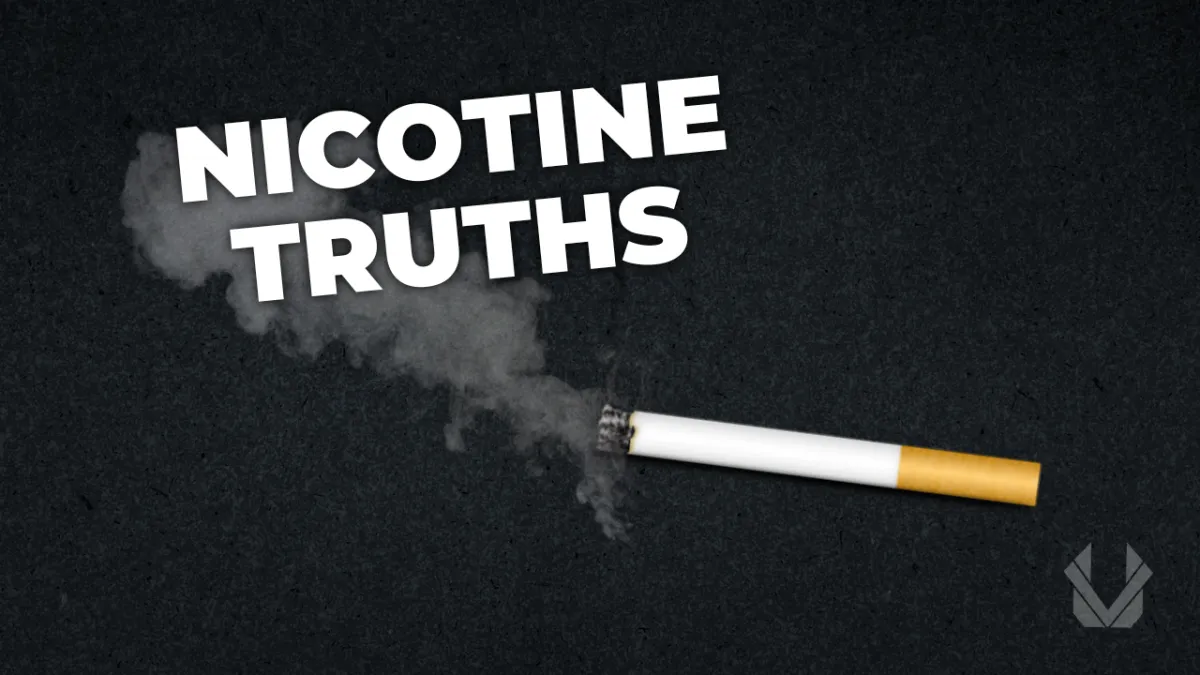THE UNYIELDING VIGOR BLOG
Our goal is to give you the most scientifically accurate and POWERFUL biological enhancement resources in the world
We're here to set new standards for truth, accuracy and effectiveness in the health industry. You'll find more value and scientific proof in our free articles than in most content you pay for.

Unraveling the Complexities of Nicotine and Smoking: Are There Any Benefits?
Unraveling the Complexities of Nicotine and Smoking: Are There Any Benefits?
A lot of debate has sparked up online over whether nicotine may be worth consuming, following research on potential brain boosting abilities and a potential increase in testosterone. However, don’t be fooled, harm is present in BOTH smoking and standalone nicotine. And these potential benefits that look tempting aren’t exactly sustainable either…
A couple of years ago I picked up the habit of vaping nicotine. Not long after, I also started smoking cigarettes. The relief was so blissful initially that I found myself completely under the spell of addiction shortly after.
However, I would find myself mentally restless after going some time without a smoke. I was also out of breath walking up a flight of stairs- not a good sign at all. The stress that resulted from the cravings also drained my libido.
Luckily, I was fully aware of the harms this awful habit was having on my body and mind, and I could proactively overcome the restraints of addiction to get my vigor back.
Cognition
It is believed that nicotine may offer cognitive enhancing and neuroprotective effects ¹ ², potentially lowering the risk of neurodegenerative diseases and improving work efficiency.
Nicotine's primary mode of action is through binding to and activating nicotinic acetylcholine receptors (nAChRs) in the brain. These receptors are ligand-gated ion channels that respond to the neurotransmitter acetylcholine. There are several subtypes of nAChRs in the brain, and nicotine predominantly binds to the α4β2 and to a lesser extent α7 subtypes.
Activation of the α7 subtype of nAChRs is particularly associated with attention and memory enhancement ³. This receptor subtype is abundantly present in the hippocampus, a region crucial for learning and memory.
Nicotine also indirectly increases the release of acetylcholine by stimulating presynaptic nAChRs. In presynaptic neurons, nAChRs regulate the release of neurotransmitters, not just acetylcholine itself, but also dopamine, glutamate, and GABA. This can lead to increased synaptic transmission ⁴ and can enhance the signal-to-noise ratio, facilitating better information processing ⁵. Acetylcholine is involved in attention, memory, and arousal ⁶. In postsynaptic neurons, nAChRs mediate depolarization. When activated, they allow cations (such as sodium and calcium) to flow into the neuron, leading to membrane depolarization and increased excitability. This can facilitate the propagation of action potentials, potentially enhancing synaptic signaling.
Furthermore, nicotine can facilitate long-term potentiation in the hippocampus and amygdala ⁷, a process that underlies learning and memory. LTP involves the strengthening of synaptic connections, making them more likely to transmit signals.
However, it’s not all positives when it comes to cognition. With chronic nicotine exposure, the brain can adapt by either upregulating or downregulating nAChRs. This adaptation can lead to the development of tolerance (needing more nicotine for the same effects) and withdrawal symptoms when nicotine levels drop. Thus, I would not recommend nicotine for cognition. Instead I would opt for tropisetron (blog post link embedded), which shares similar benefits without any addiction or tolerance potential.
Androgens
Nicotine has been associated with temporary increases in testosterone and dihydrotestosterone (DHT) levels ⁸, possibly due to aromatization inhibition and its stimulating effects on the adrenal glands. However, this increase is likely temporary as chronic nicotine exposure, particularly through smoking, has been associated with a decrease in testosterone levels over time ⁹. From this study, nonsmokers had an average total T of 445 ng/dL and smokers an average total T of 391 ng/dL. Nicotine is also known to decrease CAMP in leydig cells, thus disrupting steroidogenesis ¹⁰.
Firstly, Nicotine has been shown to be an aromatase inhibitor ¹¹ ¹². This means it reduces the enzyme’s ability to convert androgens to estrogen. Estrogen is a negative feedback regulator of the HPTA axis, so this effect would certainly increase free and total testosterone.
Nicotine can stimulate the adrenal glands ¹³, which may lead to the release of more hormones, including dehydroepiandrosterone (DHEA) and dehydroepiandrosterone sulfate (DHEA-S). These are precursors to testosterone.
As the research on this is quite conflicted, I would avoid nicotine as a means to boost testosterone. There are far better options, as shown in our free ‘Dangers of Most Testosterone Supplements: Superior Alternatives’ ebook.
Other Undesirable Effects
Nicotine and smoking have many other impactful effects besides the brain and hormones, all of which present great harm to the body.
Smoking in particular, introduces a barrage of harmful chemicals into the body, triggering inflammation and cellular damage ¹⁴ through many pathways such as MMP-9 and IL-8. This can have far-reaching consequences on various bodily systems, including the cardiovascular and respiratory systems.
Perhaps the most notorious consequence of smoking is its devastating impact on the lungs. Chronic exposure to smoke can lead to conditions like chronic obstructive pulmonary disease (COPD) and lung cancer ¹⁵.
Nicotine narrows and damages blood vessels through vasoconstriction ¹⁶, restricting blood flow and leading to a higher risk of cardiovascular diseases, including heart attacks and strokes.
If this wasn’t enough you should be aware that nicotine is a very addictive substance, leading to physical and psychological dependence.
The α4β2 subtype of nAChRs is one of the most abundant subtypes in the brain, particularly in regions associated with reward and addiction, such as the mesolimbic pathway, which includes the nucleus accumbens and the ventral tegmental area. Activation of α4β2 nAChRs leads to an increase in dopamine release in the mesolimbic pathway ¹⁷ ¹⁸. Dopamine is a neurotransmitter associated with pleasure, reward, and reinforcement. This surge in dopamine levels reinforces the behavior of nicotine consumption, contributing to the development of addiction.
When nicotine levels drop, individuals experience withdrawal symptoms. These symptoms, which can include irritability, anxiety, and cravings, are a result of the brain's adaptation to chronic nicotine exposure.
Breaking free from this cycle can be immensely challenging and often requires significant support and resources, even once aware of all of the above issues. Thus, I would caution against nicotine usage. A good alternative to nicotine, that does not exhibit euphoria or addiction potential, but can help you quit nicotine, is explained within our Testosterone Maximization course. This course will not only help you navigate dangerous toxins like nicotine, but optimize the rest of your lifestyle for true masculine vigor.
Unleash Your Vigor and Conquer Your Limits,
Thomas Muldoon
GET OUR NEW, FREE TESTOSTERONE SUPPLEMENT GUIDE FOR 2024
Toxic Testosterone: The Hidden Health Risks of the 6 Most Common Testosterone Supplements
(Created and proven with the results of 107 scientific studies)

Unleash Your Vigor & Conquer Your Limits!
-Unyielding Vigor

